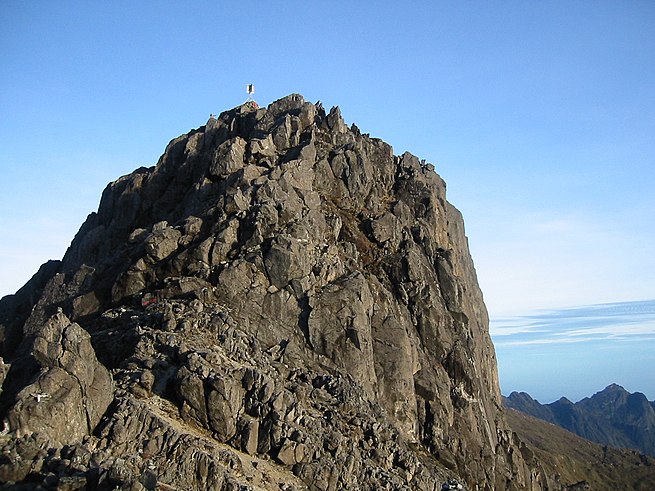
Main Difference
The main difference between Mountain and Fell is that the Mountain is a large landform that stretches above the surrounding land and Fell is a high and barren landscape feature.
-
Mountain
A mountain is a large landform that stretches above the surrounding land in a limited area, usually in the form of a peak. A mountain is generally steeper than a hill. Mountains are formed through tectonic forces or volcanism. These forces can locally raise the surface of the earth. Mountains erode slowly through the action of rivers, weather conditions, and glaciers. A few mountains are isolated summits, but most occur in huge mountain ranges.
High elevations on mountains produce colder climates than at sea level. These colder climates strongly affect the ecosystems of mountains: different elevations have different plants and animals. Because of the less hospitable terrain and climate, mountains tend to be used less for agriculture and more for resource extraction and recreation, such as mountain climbing.
The highest mountain on Earth is Mount Everest in the Himalayas of Asia, whose summit is 8,850 m (29,035 ft) above mean sea level. The highest known mountain on any planet in the Solar System is Olympus Mons on Mars at 21,171 m (69,459 ft).
-
Fell
A fell (from Old Norse fell, fjall, “mountain”) is a high and barren landscape feature, such as a mountain range or moor-covered hills. The term is most often employed in Fennoscandia, the Isle of Man, parts of Northern England, and Scotland.
-
Mountain (noun)
A large mass of earth and rock, rising above the common level of the earth or adjacent land, usually given by geographers as above 1000 feet in height (or 304.8 metres), though such masses may still be described as hills in comparison with larger mountains.
“Everest is the highest mountain in the world.”
“We spent the weekend hiking in the mountains.”
-
Mountain (noun)
A large amount.
“There’s still a mountain of work to do.”
-
Mountain (noun)
A very large person or thing.
“He was a real mountain of a man, standing seven feet tall.”
-
Mountain (noun)
A difficult task or challenge.
-
Mountain (noun)
A woman’s large breast.
-
Mountain (noun)
The twenty-first Lenormand card.
-
Fell (verb)
To make something fall; especially to chop down a tree.
-
Fell (verb)
To strike down, kill, destroy.
-
Fell (verb)
To stitch down a protruding flap of fabric, as a seam allowance, or pleat.
-
Fell (noun)
A cutting-down of timber.
-
Fell (noun)
The stitching down of a fold of cloth; specifically, the portion of a kilt, from the waist to the seat, where the pleats are stitched down.
-
Fell (noun)
The end of a web, formed by the last thread of the weft.
-
Fell (noun)
An animal skin, hide, pelt.
-
Fell (noun)
Human skin (now only as a metaphorical use of previous sense).
-
Fell (noun)
A rocky ridge or chain of mountains.
-
Fell (noun)
A wild field or upland moor.
-
Fell (noun)
Gall; anger; melancholy.
-
Fell (adjective)
Of a strong and cruel nature; eagre and unsparing; grim; fierce; ruthless; savage.
“one fell swoop”
-
Fell (adjective)
Strong and fiery; biting; keen; sharp; pungent
-
Fell (adjective)
Very large; huge.
-
Fell (adjective)
Eager; earnest; intent.
-
Fell (adverb)
Sharply; fiercely.
-
Fell (verb)
cut down (a tree)
“33 million trees are felled each day”
-
Fell (verb)
knock down
“Whitlock felled him with one punch”
-
Fell (verb)
stitch down (the edge of a seam) to lie flat
“a flat-felled seam”
-
Fell (noun)
an amount of timber cut.
-
Fell (noun)
a hill or stretch of high moorland, especially in northern England
“Cross Fell”
-
Fell (noun)
an animal’s hide or skin with its hair.
-
Fell (adjective)
of terrible evil or ferocity; deadly
“the fell disease that was threatening her sister”
